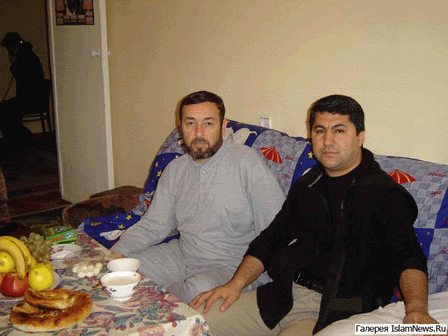Why is the Islamic Renaissance Party of Tajikistan Playing it Safe?

Leader of the Islamic Renaissance Party, Mukhaddin Kabiri (on right)
The upcoming presidential elections in Tajikistan look as if they will differ very little from those that preceded it. There is virtually no political competition ready to publicly contest President Rakhmanov, but there is also no interest on the part of the international community in highlighting the artificial nature of the elections. Instead, as has been the case since the civil war in Tajikistan ended, most interested parties are doing their best to ignore the elections, minimize their participation, or prevent publicizing that the elections are even taking place. While the international community is carefully avoiding any statements about the elections and local civil society organizations are avoiding any participation in the process, five political parties have announced their candidates for the presidency. This includes a candidate from the socialist party, but the party, which was split (some say with government assistance), does not recognize the candidate. Two other recently formed parties that have nominated candidates, the Agrarian Party and the Economic Reform Party, are decidedly pro-Rakhmanov and are unlikely to provide much competition. The Communist Party, which has become increasingly pro-Rakhmanov, has quietly put forth a candidate but he is also unlikely to present a challenge to the incumbent. Finally, the People’s Democratic Party has nominated Rakhmanov as their candidate, and he is ensured to win the election. Two opposition parties, the Democratic Party and the Social-Democratic Party, have boycotted the elections, but the Democratic is already complaining that it is being harassed by authorities due to its action. The real surprise, however, is the Islamic Renaissance Party (IRP), which is the second most popular party in the country. The IRP’s leader, Mukhiddin Kabiri, has quietly announced that his party will not run a candidate in the elections. Most likely, Kabiri has made a deal with the Tajik government in exchange for his party’s decision. But, there may be another reason that the IRP has decided to avoid participation in these elections. The IRP has a long-term vision of politics. It is quietly working on the local level to establish a strong constituency for the future. The party is aware that the people of Tajikistan will eventually be ready for an alternative to the corruption that is now widespread in the country. As the only party with a spiritual ideology, the IRP will be the best placed to fill a power vacuum once people in the country are ready to actively seek an end to the corruption and patron-client relations that characterize the present situation in Tajikistan. If that is the case, one must also wonder what kind of government the IRP would form and how various international forces, including both Russia and the United States, would react to a government in the region that is run by an overtly Islamic political party.



0 Comments:
Post a Comment
<< Home